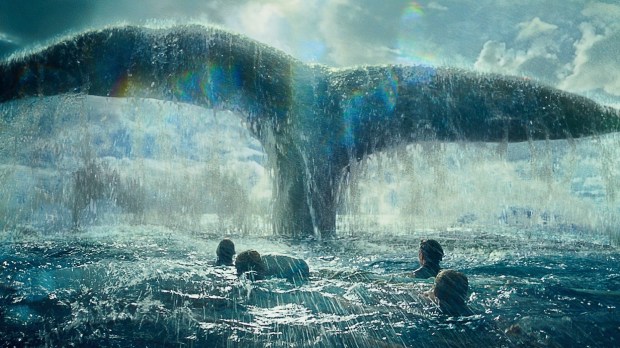The other morning, I was trying to describe for my wife Ron Howard’s new movie “In the Heart of the Sea.” I’d been invited to an early screening and she was wondering what I thought of it. I mentioned some of the details and plot points: copious amounts of whale blubber, blood erupting from a wounded blow hole, a ship being torn apart by a monstrous whale, starvation, deprivation, suicide, even cannibalism.
“And yet after that,” she said, “they still didn’t kill the whale?”
Aye, captain. There’s the rub.
On the one hand, there’s a lot to admire in this, including some eye-popping CGI effects that really do take you into the heart of the sea and had me wondering several times, “How did they get the whale to do that on cue?” You can almost taste the saltwater and smell the whale oil. The performances by Chris Hemsworth (better known as “Thor”), Benjamin Walker and Tom Holland are sturdy and credible. And the drum-driven, chest-thumping score by Roque Baños works mightily to up the ante.
But to what end? Ultimately, it’s a grim and ghoulish story about bad luck, big fish and hungry sailors at sea. The moral remains elusive. Don’t taunt the fish? Go looking for trouble and you’ll find it? Pack extra sandwiches when you go fishing? I dunno.
If you’re looking for a feel-good holiday flick, this isn’t it.
Based on the true story that inspired “Moby Dick,” the movie itself seems to have been inspired by other movies; you don’t have to look far to find elements of “Jaws,” “King Kong,” “Cast Away,” “Apollo 13” and “Unbroken.” (The framing device—an older, memory-haunted seafarer telling a confessional tale to a young Herman Melville—also nods to “Amadeus.”) The first half of the film lays out the relative tranquility a New England whaling village and then establishes the rigors and dangers of life at sea, with squalls and storms shredding the sails. All this hints at something compelling to come. But once the plot really gets rolling, and the whale makes his entrance (and it is a spectacular one) the movie sails into murkier waters.
A potentially interesting conflict between the preening captain and his more experienced first mate goes nowhere. The central moral questions of the story—what will men do to survive, and how will they live with the consequences?—are largely unexplored. Messy ethical issues pop up, such as (not insignificantly) killing off crew members so others can survive on their flesh. But if anyone has moral misgivings about all this, or pangs of guilt, they keep them to themselves. Though the sailors board the ship amid prayers from townfolk echoing from the dock, nobody during the subsequent ordeal mentions prayer, religion, faith or God; they don’t seek consolation from any higher power. And once they are back on dry land, the survivors for the most part don’t appear terribly traumatized by what transpired. Life goes on. (Footnote: Want to see a good Ron Howard fish movie? Rent “Splash.”)
What might have been a rousing drama about the triumph of the human spirit ends up being a long, macabre fish story. Director Ron Howard and screenwriter Charles Leavitt were evidently aiming for something bigger and bolder. But they missed. Their harpoon barely grazed the beast.
Yeah. After all that, they still didn’t kill the whale.
Photo: Warner Brothers

